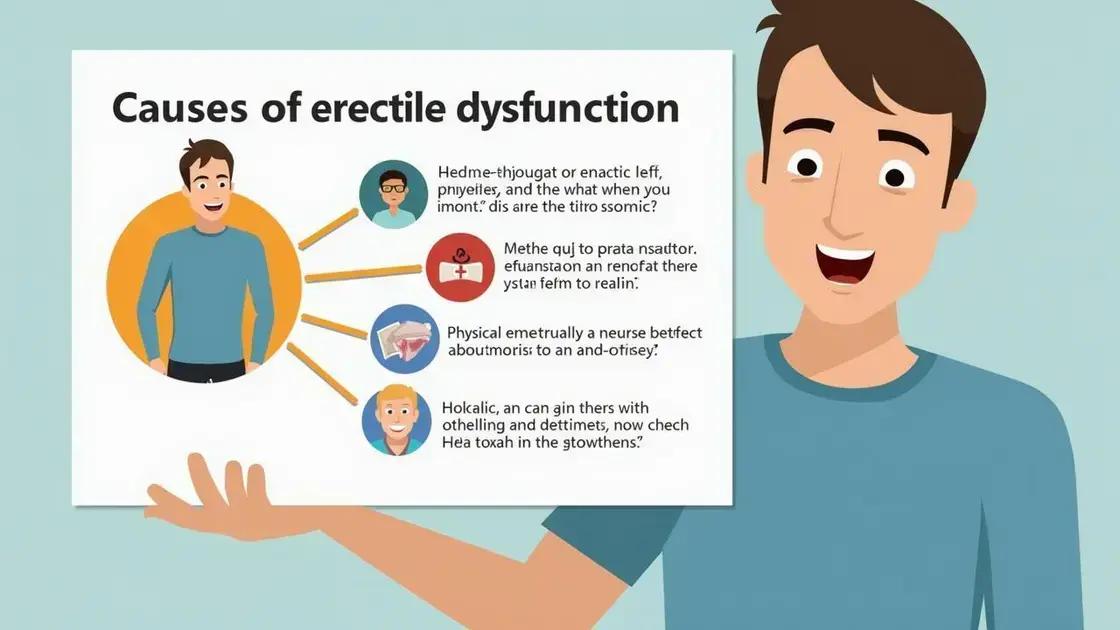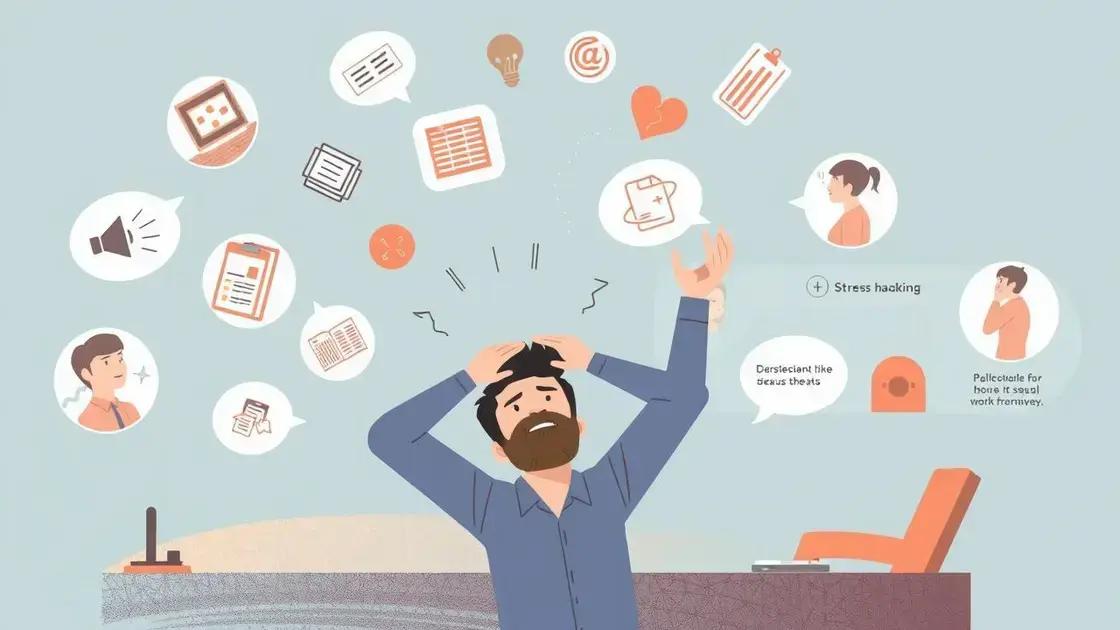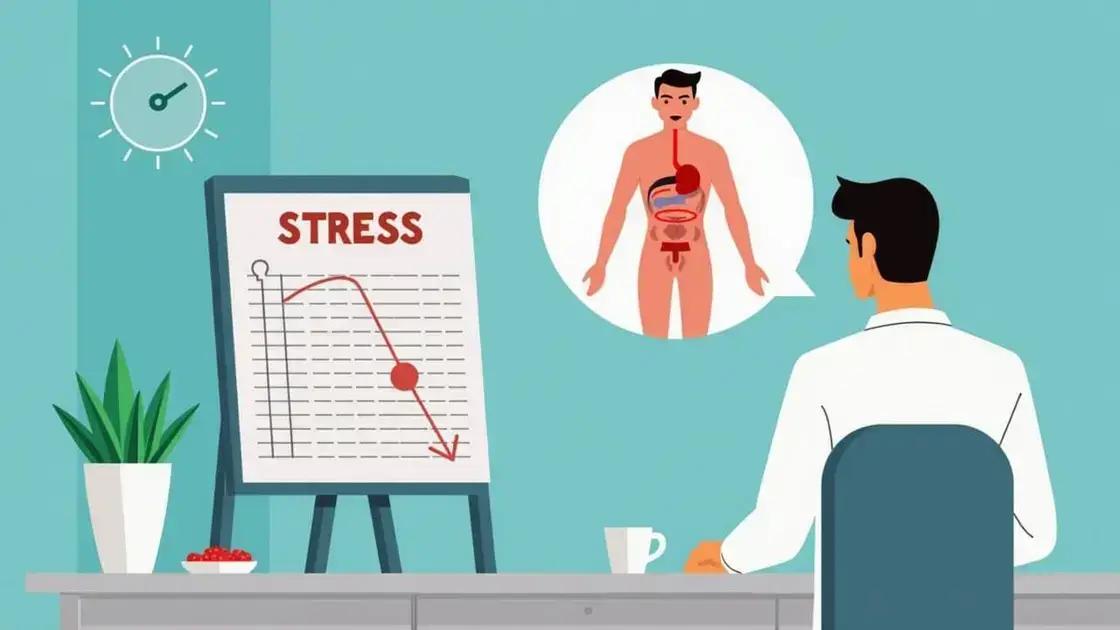Understanding how stress affects erectile dysfunction is essential for tackling this common issue. Stress can trigger hormonal responses that hinder erectile function, leading to anxiety and diminished sexual performance. Coping mechanisms such as mindfulness, regular exercise, and seeking professional help can significantly improve both stress levels and erectile function. Open communication with partners and a healthy lifestyle are also crucial for overcoming this challenge.
Understanding how stress affects erectile dysfunction is essential for many men facing sexual health challenges. Stress can significantly impact erectile function, leading to difficulties in achieving or maintaining an erection. In this article, we will delve into the intricate relationship between stress and erectile dysfunction, explore coping mechanisms, and discuss the importance of seeking professional help. By addressing these issues, men can improve their overall well-being and regain confidence in their sexual health.
Understanding Erectile Dysfunction

Erectile dysfunction (ED) affects many men and can be caused by various factors. Understanding erectile dysfunction is the first step toward addressing it. ED is characterized by the inability to achieve or maintain an erection sufficient for satisfactory sexual performance. This can lead to feelings of frustration, anxiety, and low self-esteem.
Common Causes of Erectile Dysfunction
Several physical and psychological issues can contribute to erectile dysfunction. Physical causes often include conditions like diabetes, obesity, heart disease, and hormonal imbalances. On the other hand, psychological factors such as stress, anxiety, and depression can also play a significant role in ED.
The Importance of Open Communication
Discussing erectile dysfunction openly with partners can help alleviate stress and anxiety surrounding the issue. Open communication fosters understanding and support, making it easier to navigate feelings of inadequacy that often accompany ED.
Impact on Relationships
ED does not only affect the individual; it can also impact relationships. Many couples may experience tension or emotional distance due to erectile dysfunction. Recognizing and addressing these concerns is crucial for maintaining healthy relationships and emotional intimacy.
Seeking Help
It is essential for men experiencing erectile dysfunction to seek help from healthcare professionals. Various treatment options are available, including medication, therapy, and lifestyle changes, tailored to the individual’s needs. Consulting with a doctor can provide valuable insights into overcoming this condition.
The Role of Stress in Sexual Health

Stress plays a significant role in overall sexual health, impacting both physical and emotional well-being. The role of stress in sexual health is often underestimated, but high stress levels can lead to various sexual dysfunctions, including erectile dysfunction. When a person experiences stress, the body releases hormones like cortisol and adrenaline. These hormones can interfere with normal sexual response, making it difficult to achieve an erection.
Physical Impact of Stress
Physically, stress can cause blood vessels to narrow and blood flow to decrease. This reduced blood circulation can hinder an erection. Stress can also lead to fatigue and low energy levels, which may result in diminished libido. Moreover, lifestyle factors associated with stress, such as poor eating habits, lack of exercise, and increased alcohol consumption, can further complicate sexual health.
Psychological Effects
On the psychological side, stress can create anxiety about sexual performance. This anxiety can build up, creating a cycle where the fear of not performing leads to even more stress. Negative thoughts can cloud judgment and diminish self-esteem, making it challenging to relax in intimate situations.
Stressors in Everyday Life
Common stressors include work pressures, relationship issues, financial concerns, and health problems. Each of these factors can weigh heavily on the mind, distracting individuals from intimacy and connection. Recognizing these stressors is crucial for addressing their effects on sexual health.
Importance of Management
Managing stress is essential for improving sexual health. Techniques such as mindfulness, exercise, and talking about issues with a partner can significantly reduce stress levels. By actively addressing stress, individuals can enhance their sexual well-being and overall relationship satisfaction.
How Stress Impacts Erectile Function

Stress has a profound effect on erectile function, impacting both the mind and body. How stress impacts erectile function is essential to understand for anyone facing such challenges. When bad stress arises, the body reacts by releasing hormones like cortisol, which can interfere with sexual arousal.
Physiological Effects
High stress levels can constrict blood vessels, limiting blood flow to the penis. This reduced circulation is critical for achieving and maintaining an erection. Stress can also lead to fatigue, diminishing overall energy and interest in sexual activity, thus affecting erectile performance.
Emotional Distress
Emotional states such as anxiety and fear about performance can create a negative feedback loop. When men worry about their ability to perform sexually, this anxiety can increase stress, further complicating erectile function. This cycle may lead to an increased sense of failure, creating more emotional distress.
Impact of Chronic Stress
Chronic stress can cause long-term problems. Over time, persistent stress can lead to more serious health issues such as depression, anxiety disorders, and even physical health concerns like heart disease, complicating sexual health further. The longer the stress remains, the more difficult it may become to reverse its effects on erectile function.
Lifestyle Factors
Stress often causes changes in daily habits, such as poor sleep, unhealthy eating, and lack of exercise. These lifestyle choices can contribute to erectile dysfunction. Addressing stress can therefore be a crucial first step in improving overall health and sexual performance.
Coping Mechanisms for Stress and ED

Coping with stress is important for maintaining sexual health and addressing erectile dysfunction. Coping mechanisms for stress and ED can vary, but finding the right approach can significantly benefit men facing these challenges.
Mindfulness and Relaxation Techniques
Practicing mindfulness can help reduce anxiety and improve focus. Techniques such as deep breathing, meditation, and yoga are effective ways to manage stress and promote relaxation. These methods can create a calmer mindset, making it easier to approach intimate moments without fear.
Regular Physical Activity
Engaging in regular exercise is a great way to relieve stress. Physical activity releases endorphins, which improve mood and reduce feelings of anxiety. Aim for at least 30 minutes of exercise most days of the week to enhance both physical and mental well-being.
Healthy Lifestyle Choices
Making healthy lifestyle choices is vital. Eating a balanced diet, getting enough sleep, and limiting alcohol intake can all help reduce stress levels. These habits lead to better overall health, improving both mood and erectile function.
Open Communication with Partners
Discussing feelings and concerns with a partner can alleviate stress associated with erectile dysfunction. Open communication helps build intimacy and understanding, enabling couples to support each other effectively.
Professional Support and Therapy
Sometimes, seeking professional help is necessary. Speaking with a therapist or counselor can provide valuable tools for coping with stress and anxiety related to sexual performance. Professional support can also help address any underlying emotional or psychological issues that may contribute to erectile dysfunction.
Seeking Professional Help for ED

Seeking professional help for erectile dysfunction (ED) is a crucial step for many men. Seeking professional help for ED can offer effective treatment options and valuable support. Healthcare providers can assess individual cases and help identify the underlying causes of ED, whether they are physical or psychological.
Types of Professionals to Consult
Men can start by consulting their primary care physician. A doctor can provide a thorough medical evaluation and recommend appropriate specialists if needed. Urologists specialize in male reproductive health and can offer targeted treatments for erectile dysfunction. Additionally, mental health professionals, such as therapists or psychologists, can assist men dealing with emotional and psychological factors affecting their sexual health.
Importance of Open Dialogue
Openly discussing erectile dysfunction with a healthcare provider can be uncomfortable, but it is essential. Professionals are trained to handle these sensitive topics while maintaining confidentiality. Sharing detailed information about symptoms and their impact on daily life can help doctors develop the best treatment plan.
Treatment Options Available
Treatment options for ED may include medications, therapy, vacuum devices, or surgical solutions. Doctors can explain the benefits and risks associated with each option, helping men make informed decisions about their care.
Psychological Support
For those who experience anxiety or self-esteem issues related to ED, seeking psychological support is essential. Therapy can address underlying concerns and help men cope with the emotional aspects of erectile dysfunction. Support groups or counseling can create a safe space to share experiences and feelings.
Follow-Up and Ongoing Care
A follow-up appointment is often necessary to assess the effectiveness of the chosen treatment plan. Regular check-ins with healthcare providers can help manage ongoing concerns and adjust treatments as needed for optimal sexual health.
In Summary: Addressing Erectile Dysfunction and Stress
Understanding how stress affects erectile dysfunction is vital for achieving better sexual health. From recognizing the impact of stress on physiological and emotional aspects to exploring coping mechanisms, men can take proactive steps to manage their well-being.
Professional help plays a crucial role in addressing erectile dysfunction effectively. By consulting healthcare providers, individuals can access tailored treatment options and receive the emotional support they need.
It’s important for men to remember that erectile dysfunction is a common issue, and there are solutions available. Through awareness, open communication, and appropriate care, men can navigate this challenge and enhance their sexual health.
Ultimately, taking action against stress and erectile dysfunction can lead to improved relationships and a better quality of life.
FAQ – Frequently Asked Questions about Stress and Erectile Dysfunction
How does stress lead to erectile dysfunction?
Stress affects the body by releasing hormones that can restrict blood flow and create anxiety about sexual performance, both of which can contribute to erectile dysfunction.
What coping mechanisms can help manage stress related to ED?
Coping mechanisms include practicing mindfulness, engaging in regular physical activity, maintaining a healthy lifestyle, communicating openly with partners, and seeking professional support.
When should I seek professional help for erectile dysfunction?
You should seek professional help if you experience ongoing issues with erectile dysfunction, as healthcare providers can offer tailored treatments and support.
What types of professionals can assist with ED?
You can consult your primary care physician, a urologist, or a mental health professional for help with erectile dysfunction.
Are there effective treatments available for erectile dysfunction?
Yes, treatments for erectile dysfunction can include medication, therapy, vacuum devices, and even surgical options depending on individual needs.
How important is communication with my partner regarding ED?
Open communication with your partner is vital. It helps build intimacy, reduces anxiety, and allows both partners to support each other through challenges.













